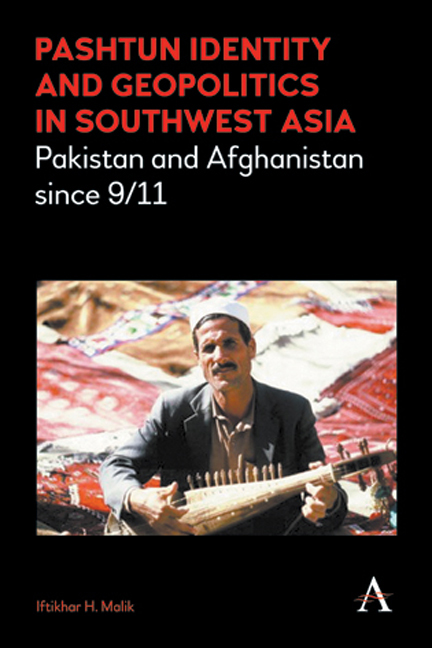Book contents
- Frontmatter
- Contents
- Preface
- Acronyms
- Glossary
- Maps
- Introduction
- Chapter One Gandhara Lands: Wrestling with Pashtun Identity and History
- Chapter Two Imperial Hubris: The Afghan Taliban in Ascendance
- Chapter Three Masculinities in Conflict: Western Pedagogy and the Return of the Afghan Taliban
- Chapter Four Understanding Pakistan: Geopolitical Legacies and Perspectives on Violence
- Chapter Five Understanding Civic Sentiments and Movements in Pakistan: Stalemated Cycle, or a Way Forward?
- Chapter Six The United States and Pakistan: Friends or Foes!
- Chapter Seven The European Union and Southwest Asia: Perceptions, Policies and Permutations
- Conclusion: Pashtun Troubled Lands, Uncertain Southwest Asia or a New Beginning!
- Notes
- Bibliography
- Index
Chapter Two - Imperial Hubris: The Afghan Taliban in Ascendance
Published online by Cambridge University Press: 22 July 2017
- Frontmatter
- Contents
- Preface
- Acronyms
- Glossary
- Maps
- Introduction
- Chapter One Gandhara Lands: Wrestling with Pashtun Identity and History
- Chapter Two Imperial Hubris: The Afghan Taliban in Ascendance
- Chapter Three Masculinities in Conflict: Western Pedagogy and the Return of the Afghan Taliban
- Chapter Four Understanding Pakistan: Geopolitical Legacies and Perspectives on Violence
- Chapter Five Understanding Civic Sentiments and Movements in Pakistan: Stalemated Cycle, or a Way Forward?
- Chapter Six The United States and Pakistan: Friends or Foes!
- Chapter Seven The European Union and Southwest Asia: Perceptions, Policies and Permutations
- Conclusion: Pashtun Troubled Lands, Uncertain Southwest Asia or a New Beginning!
- Notes
- Bibliography
- Index
Summary
‘These are detestable murderers and scumbags, I'll tell you that right up front. They detest our freedoms, they detest our society, they detest our liberties.’
Canadian General Rick Heller, 16 July 2005‘The Taliban made some terrible mistakes, and I do not condone them. But I am also certain that we need a better understanding of how and why they made those mistakes before we condemn them. Many worse things have happened to Afghans than the Taliban government of 1996–2001 […] In the end the Taliban are only people, and surely deserve to be treated as such. I know they are capable of learning from their mistakes and of changing their minds.’
James FergussonOther than the various mainsprings of external interest in Afghanistan and the trans- Indus regions in general, and the Pashtun cultures in particular, geopolitical developments during the 1980s and then specifically after September 11 understandably came to focus on the Taliban. Along with its reductionist portents, such a discourse reveals some shared themes such as political Islam, Taliban militancy and the security imperatives of the regional and global actors, which collectively converge in imparting or reiterating specific images about Muslim and especially the Pashtun communities. The juxtaposing of Islam with violence and Islamist movements as terrorist outfits cannot be seen in isolation, as they have become brand names and identikit for most Muslims. Irreverent of their ideological, denominational, class and national pluralities, such simplified views, more like those of the erstwhile communists and Jews, have unleashed severe ramifications. Appreciation of Muslim mundane dilemmas like those of any other human society is often absent in them, or it may reflect sheer indifference if not bland hostility. Certainly, there are numerous areas in which Muslim groups and states could perform better, yet their political and economic issues, especially those linked with some external factors need to be analysed objectively within their generic contexts. After all, the evolution of various forms of political Islam such as Hamas, Hezbollah, Islamic jihad, the Muslim Brotherhood, the Moro Liberation Army, the Jammu and Kashmir Liberation Front, the Hizbul Mujahideen, the Taliban and such other formulations overwhelmingly sought sustenance in political and economic grievances in which disempowerment, a grave sense of injustice, sustained oppression and dislocations had continued.
- Type
- Chapter
- Information
- Pashtun Identity and Geopolitics in Southwest Asia , pp. 33 - 52Publisher: Anthem PressPrint publication year: 2016

